| Srl | Item |
| 1 |
ID:
133975
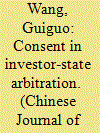

|
|
|
|
|
| Publication |
2014.
|
| Summary/Abstract |
Consent is a precondition of arbitration, regardless of whether it is between private parties to commercial transactions or a foreign investor and its host State. Consent determines the formation and competence of arbitration tribunals. It is therefore a foundation of the investor-State arbitration system. By its very nature, privity is not required in investor-State arbitration, albeit consent is essential to prove that the tribunal in question is bestowed the power to arbitrate. In addition, consent to arbitration may be given by the host State and the foreign investor at different times. It is often the case that the host State will give consent first, which is regarded as a standing offer. The acceptance of this offer by the investor, and thus its own consent, may be accomplished by its filing of a request for arbitration or by direct notification to the respondent State. Due to the variety of treaties coupled with contracts between foreign investors and host States, whether or not a host State has given consent to arbitration and the scope of the consent is often at issue. As far as the form of consent is concerned, most arbitration rules do not stipulate what may constitute a valid consent. For instance, the Convention on the Settlement of Investment Disputes between States and Nationals of Other States ('ICSID Convention') requires consent to arbitration to be in writing. It does not, however, further provide the requirements of writing. In such circumstances, disputing parties have the freedom to choose the manner of expressing their consent. In the circumstances, investment arbitration tribunals are left with much discretion in determining whether consent has been given and its validity as well as its scope. Because of this situation, the decisions of investment arbitration tribunals sometimes trigger criticisms. This article is going to examine the most relevant cases for the purpose of ascertaining the current status of investment law in operation.
|
|
|
|
|
|
|
|
|
|
|
|
|
|
|
|
| 2 |
ID:
144820


|
|
|
|
|
| Summary/Abstract |
Outward foreign direct investment (OFDI) has been an important element in Singapore’s economic strategy since the 1990s, with the government providing direct and indirect support to the internationalization process. Recent OFDI trends indicate that China has become an important destination for Singapore. In ASEAN, Singapore’s main investment markets are Indonesia, Malaysia and Thailand. Singapore’s OFDI has important sectoral dimensions, supported by evidence from econometric analysis. It is also important to distinguish between OFDI stock and flows.
|
|
|
|
|
|
|
|
|
|
|
|
|
|
|
|
| 3 |
ID:
122491


|
|
|
|
|
| Publication |
2013.
|
| Summary/Abstract |
India should adopt a flexible FDI policy to import much needed technologies which cannot be mastered through indigenous efforts in the acceptable time frame. Unfortunately, every time the issue of increasing FDI limit comes up, the opponents resort to their time-tested subterfuge of raising the bogey of security concerns and threat to indigenous industry, thereby hiding their selfish reasons. In any case, India can incorporate necessary security clauses in the initial license to ensure that an unscrupulous entrepreneur does not play truant in crisis situations. India should reserve the right to take over a facility if required in an operational emergency.
|
|
|
|
|
|
|
|
|
|
|
|
|
|
|
|
| 4 |
ID:
129950
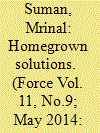

|
|
|
| 5 |
ID:
086010
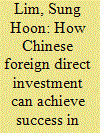

|
|
|
|
|
| Publication |
2008.
|
| Summary/Abstract |
China is transforming itself into an aggressive investor based upon its more US$1.5 tillion in foreign exchange reserves, the world's largest. However, despite the huge expansion in quality base, the substantial performace of Chinese investors, in terms of gains in profit and technology spillover effects through overseas investment, has not been satisfactory.
|
|
|
|
|
|
|
|
|
|
|
|
|
|
|
|
| 6 |
ID:
111054
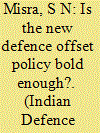

|
|
|
| 7 |
ID:
122420


|
|
|
| 8 |
ID:
133976
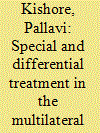

|
|
|
|
|
| Publication |
2014.
|
| Summary/Abstract |
Special and differential treatment (S&DT) provisions relate to developing and least developed members of the World Trade Organization (WTO). The effectiveness of S&DT provisions is important because they (1) address asymmetries between members and (2) give the WTO a global character, i.e. it is perceived as catering to the interests of all its members. Have these provisions been effective? Not really. This is mainly because these provisions are non-binding, ambiguous, unstructured and lack connectivity with each other. Developing countries claim they are best endeavour clauses and unrealistic. So how can these provisions be made effective? This article examines the concept of S&DT including its history, reasons behind its introduction and continuation, its merits and demerits, reasons for its success and failure, its jurisprudence, and provides suggestions for improvement.
|
|
|
|
|
|
|
|
|
|
|
|
|
|
|
|
| 9 |
ID:
132257
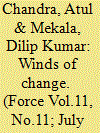

|
|
|
|
|
| Publication |
2014.
|
| Summary/Abstract |
Ensuring that delayed crucial aviation projects are delivered fast should be the new government's priority
Hope is riding high on the new Narendra Modi government. Little over a month after assuming the high office, India's Prime Minister has managed to boost the confidence of the Indian military forces. While symbolic gestures like spending a day aboard INS Vikramaditya helped to bring in motivation to the Indian Navy, which was plagued by series of accidents in the last few months; it is his policy decisions like opening up the defence industry to the private sector that has attracted foreign investors' confidence.
|
|
|
|
|
|
|
|
|
|
|
|
|
|
|
|